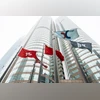Lawmakers in Hong Kong unanimously approved a second national security law, called Article 23, on Tuesday, granting the government more power to quash dissent.
Article 23 is seen as the latest step in China's sweeping political crackdown that started due to the 2019 pro-democracy protests in the financial hub.
It's a double whammy
Article 23 expands on a similar security law, the national security law (NSL), Beijing imposed in 2020.
According to reports, NSL has already silenced opposition voices in Hong Kong to a great extent.
Article 23, or the Safeguarding National Security Bill, expands the powers that authorities have by allowing them to prosecute citizens for new offences like colluding with external forces to commit illegal acts.
More From This Section
It also allows the authorities to charge citizens with offences like treason, insurrection, disclosing state secrets, and espionage, among others.
The penalties under Article 23 include life sentences.
It was passed in a hurry
Protesters had fought this law's possible implementation for years, fearing that it would further erode civil liberties in Hong Kong.
But, Hong Kong's pro-Beijing parliament reportedly fast-tracked Article 23 through its final stage in less than two weeks.
Following an electoral overhaul, Hong Kong's Legislative Council has been packed with Beijing loyalists. They rushed the law through to approval.
According to reports, the Bill was unveiled on March 8 and a committee held daily meetings for a week.
Hong Kong's Chief Executive, John Lee, a former police officer, had made an appeal to push the law through at full speed.
After the vote concluded, Lee said that the law would take effect on Saturday.
It's a contentious law
According to commentary from Western media, Article 23 will further erode civil liberties, which Beijing had promised to preserve for 50 years when Hong Kong, a former British colony, returned to Chinese control in 1997.
Critics feel that the new law will do away with Hong Kong's once-vibrant political culture, with its commitment to openness. They fear it will erode Western-style civil liberties, which could also have an impact on Hong Kong's allure as a global financial hub.
It has stringent penalties
Article 23 brings in stringent penalties for a wide range of actions that authorities have described as threats to national security.
Under the new law, the most severe offences, like treason and insurrection, will be punishable by life imprisonment.
Lesser offenses, like the possession of seditious publications, will result in several years of imprisonment.
It also has provisions that will allow criminal prosecution for acts committed anywhere in the world.
New law will impact financial professionals and businesses
According to reports, the new law has made financial professionals a worried lot because they often deal with sensitive corporate information.
Specifically, they are worried that some provisions related to the protection of state secrets are similar to the broad definition of secrets that applies in mainland China, where it covers economic, social, and technological developments and not just traditional security areas.
ALSO READ: Doing biz in China growing tougher, more uncertain: European business group
ALSO READ: Doing biz in China growing tougher, more uncertain: European business group
They are reportedly concerned that the new law could create gray areas.
Foreign business leaders have told the media that the cost of complying with the new law could lead to investors directing their capital away from Hong Kong.
Hong Kong has already changed
There were massive street protests in 2019, challenging China's rule over the semi-autonomous territory.
Due to the crackdown that followed, and with the imposition of Beijing's NSL, Hong Kong's political atmosphere has changed dramatically.
While many leading activists have been prosecuted, others have sought refuge abroad.
Pro-democracy media outlets like Apple Daily and Stand News have been shuttered.
The crackdown after the 2019 protests has even prompted an exodus of young professionals and middle-class families to the US, UK, Canada, and Taiwan.
(With agency inputs)
(With agency inputs)
)